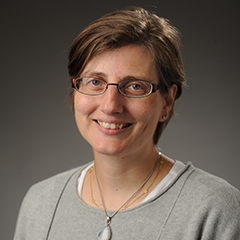Francesca Parmeggiani
Ph.D.

Professor of Italian and Comparative Literature
Faber Hall 564
718-817-2672
[email protected]
-
B.A. Università degli Studi di Bologna, Bologna, Italy
M.A. Indiana University, Bloomington, IN
Ph.D. Indiana University, Bloomington, IN -
20th- and 21st-century Italian literature; cinema; women’s writing and feminist theory; literature, film and critical theory on politics and religion in contemporary culture and society.
-
Francesca Parmeggiani teaches 20th- and 21st-century Italian literature and cinema. Her research focuses on contemporary Italian literature and culture with special interests in the representation and interplay of politics and religion in literature and film, women’s writing, and feminist theory. She is the author of the monograph Lo spessore della letteratura (Longo, 2007), a study of the fictional adaptations of Scripture by Italian writers in the 1960s and 1970s, and the co-editor of three volumes: Forme, volti e linguaggi della violenza nella cultura italiana (Edibom, 2012), an essay collection on the representation of violence in Italian culture; a special issue of the Italian journal Testo, on poetry and prayer in the Italian literary tradition, from the Middle Ages to the present; and Of Elephants and Toothaches, a collection of critical contributions on Krzysztof Kieślowski’s TV cycle, The Decalogue (Fordham UP, 2016). Her articles have appeared in Annali d’Italianistica, Autografo, Cahiers d’études italiennes, Italica, Italianistica, Romance Languages, and IMAGES, among other venues. She has been collaborating with Patrizia Guarnieri (History, University of Florence) by supervising the translation work by a team of Fordham students and Italian and U.S. colleagues for the portal, Intellettuali in fuga dall’Italia fascista / Intellectuals Displaced from Fascist Italy (click here for a RAI Radio 3 podcast in Italian on the project). She is a member of the Comparative Literature Program, which she co-directed from 2007 to 2011, and a member of the Women, Gender, and Sexuality Studies Program. She serves on the Faculty Senate.
-
- Approaches to Literature
- Reading Culture Through Literature
- Filming the City Inside and Out: A Cinematic Journey through Italy
- The Souths of Italy: Words, Images, and Sounds
- Italy at War
- Anni di Piombo / Years of Lead: Culture, Politics, and Violence
- Italophone Migrant Literature from Africa and Beyond
- Rewriting the Mediterranean (20th and 21st Centuries)
- Intercultural Theory
-
“Umanesimo di Mario Pomilio: nota su materialità e spiritualità nel Quinto evangelio.” Prospettive su una “meta mobile”. Il quinto evangelio di Mario Pomilio, ed. F. Francucci and T. Pomilio. Spec. issue of Autografo no. 69, XXXI (2023): 79-92.
“Laura Pariani e ‘il potere sovversivo dello scrivere’: lettura di Di ferro e d’acciaio (2018).” Fantascienza femminista. Immaginare il genere nella cultura italiana contemporanea, ed. R. Onnis, A.C. Palladino and M. Spinelli. Firenze: Franco Cesati Editore, 2022. 67-74.
“Le sorelle di Laura Pariani.” Escrituras y escritoras (im)pertinentes: narrativas y poéticas de la rebeldía, ed. E. Moreno-Lago. Madrid: Dyckinson, 2021. 243-253.
“Alda Merini in parole e immagini: Ogni sedia ha il suo rumore (1995) di Antonietta De Lillo.” “Le più belle poesie si scrivono sopra le pietre.” Contributi critici sull’opera di Alda Merini, ed. F. Pisanelli. Roma: @Aracne, 2021. 131-142.
“‘Come se dietro il mio viso, in trasparenza, ce ne fosse un altro’: A testa in giù di Armanda Guiducci.” Altre. Il doppio e le alterità femminili nella cultura italiana ed europea, ed. A. Tylusińska-Kowalska, D. Lipszyc and G. Cilloni-Gaździńska. Warsaw: Institute of Specialized and Intercultural Communication, 2019. 40-50.
“Kieślowski Re-read: On Reality, Realism and Cinema.” Kieślowski Revisited (and Re-watched), ed. M. Jazdon and P. Pławuszewski. Spec. issue of IMAGES: The International Journal of European Film, Performing Arts and Audiovisual Communication 24.33 (2018): 61-71.
“Indagare le donne, indagare se stesse: la scrittura saggistica di Armanda Guiducci.” Escrituras autobiográficas y canon literario, ed. Milagro Martín Clavijo. Sevilla: Benilde Ediciones, 2017. 384-403.
Of Elephants and Toothaches: Ethics, Politics, and Religion in Krzysztof Kieślowski’s Decalogue. New York: Fordham UP, 2016. (Co-edited with Eva Badowska)
Poesia e preghiera. Spec. issue of Testo. Studi di teoria e storia della letteratura e della critica 70.2 (2015). (Co-edited with Erminia Ardissino)
“Militanza e poesia in Poesia che mi guardi (2009) di Marina Spada.” Filmare il femminismo. Studi sulle donne nel cinema e nei media, ed. L. Cardone and S. Filippelli. Pisa: ETS, 2015. 129-140.
“Armanda Guiducci e le sfide dell’identità.” “On ne naît pas... on le devient”: I gender studies e il caso italiano, dagli anni Settanta a oggi, ed. L. El Ghaoui and F. Fonio. Spec. issue of Cahiers d’études italiennes 6 (2013): 271-280.
Forme, volti e linguaggi della violenza nella cultura italiana. Lonato del Garda: Edibom, 2012. (Co-edited with Federica Colleoni)
“Speaking of God: The Post-Secular Challenge for Italian Feminist Thought and Practices.” Annali d’Italianistica 29 (2011): 417-430.
Lo spessore della letteratura. Presenze neotestamentarie nella narrativa italiana degli anni Sessanta e Settanta. Ravenna: Longo, 2007.